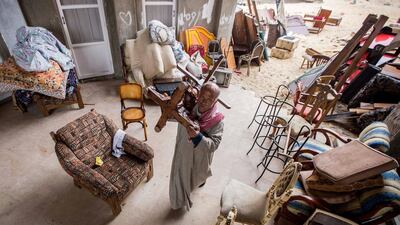ISMAILIA // Said Sameh Adel Fawzy knew it was time to leave his home in Egypt’s northern Sinai town of El Arish.
Islamic militants had barged into his uncle’s house, shot him and his son dead, then looted the place and set it on fire.
The 35-year-old Christian, who owns a plumbing supply business in El Arish, packed up a few belongings and took his family to the Suez Canal city of Ismailia, joining hundreds of Christians fleeing a spate of sectarian killings last week.
“My cousin went to open the door after he heard knocking,” Mr Fawzy said, speaking from a youth hostel where authorities were putting up dozens of families who fled the town.
“Masked extremists, terrorists with a pistol, took him inside and shot him in the head,” before dragging his screaming mother out to the street half-dressed and killed her husband. The woman, still in shock after the Tuesday night slayings, sat nearby.
“They’re thirsty for the blood of any Christian,” said Wafaa Fawzy, the sister-in-law of Saad Hana, the man who was killed along with his son. “They were pretty clear when they said they won’t leave any Christian in peace. They want an Islamic state.”
The killings, two of seven brutal slayings in recent weeks, come after a devastating ISIL suicide bombing at a Cairo church in December that killed nearly 30 people. The violence poses a fresh challenge to President Abdel Fattah El Sisi’s government to put down an ISIL-led insurgency in northern Sinai and prevent spillover that at times has reached the mainland.
The group’s local affiliate recently vowed to step up a wave of attacks on the embattled Christian minority, pointing to a shift in tactics toward targeting Christians and their holy sites, which are less protected than the military and police installations that are their usual targets.
Northern Sinai has for years been the epicenter of an insurgency by Islamic militants, and the area’s few Christians have been trickling out. But departures surged after suspected militants again gunned down a Christian man in front of his family two days after Mr Fawzy’s uncle and cousin were killed, stoking panic among Christians.
No militant group has claimed responsibility for the attacks. But the ISIL affiliate, which is based in northern Sinai, released a video vowing to step up attacks against Christians, who it describes as “infidels” empowering the West against Muslims.
Coptic Christians, who make up about 10 per cent of Egypt’s population, have always been a favourite target of Islamic extremists. But attacks on churches have increased since the 2013 military overthrow of an Islamist president. Christians overwhelmingly supported Mr El Sisi, the army chief-turned-president, who led the operation, and extremists have used their support as a pretext to increase attacks against them.
The Christian exodus continued for a fourth day on Sunday, bringing to more than 100 the number of families who have fled El Arish, said Nabil Shukrallah, an official with the city’s Evangelical Church.
Families arrive frightened and in need of supplies, which are being stockpiled at the church from donations from several parishes, he said. The new arrivals are then housed in and around the city, in private homes or in accommodations provided by the government.
“They’re exhausted, with urgent needs for food and children’s clothing,” he said, as one father carried a sick infant to be evacuated by ambulance. “They’re terrified of the violence and brutality.”
Before Egypt’s 2011 Arab Spring uprising, about 5,000 Christians lived in northern Sinai, but that number has since dwindled to fewer than 1,000, according to Christian clergy members and residents. Egypt does not keep official statistics on the number of Christians in specific regions or nationwide.
*Associated Press

